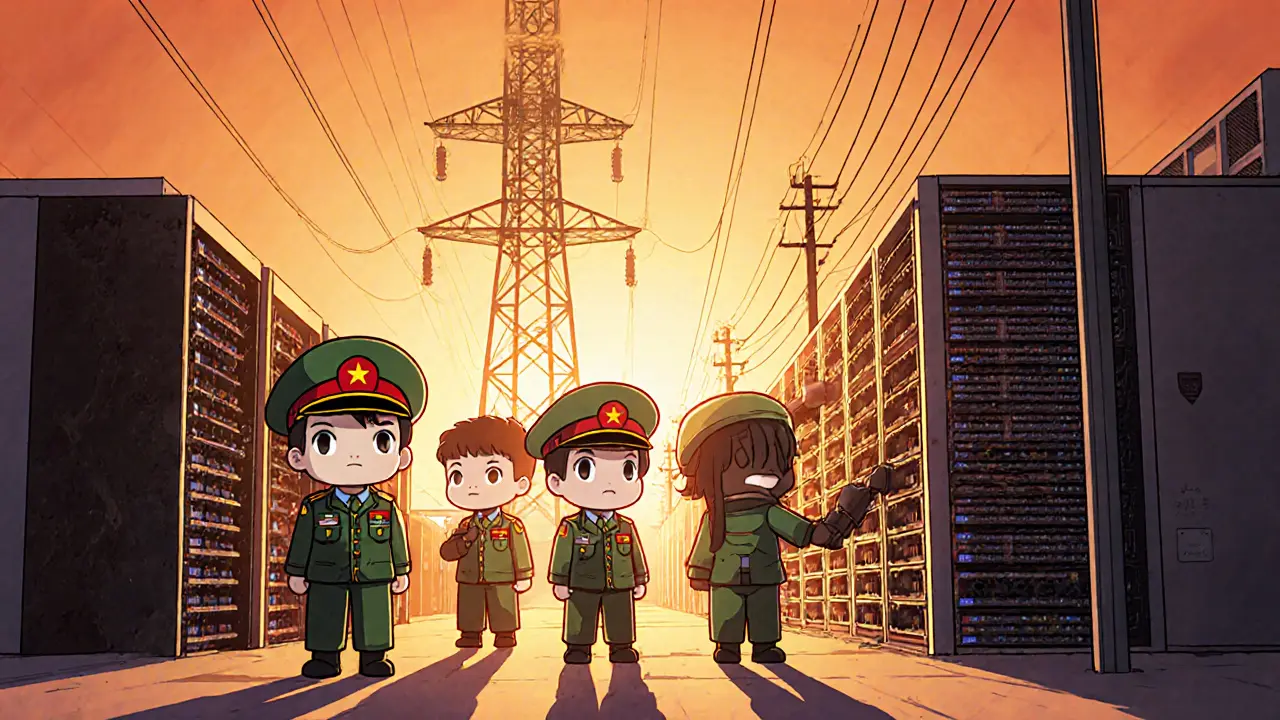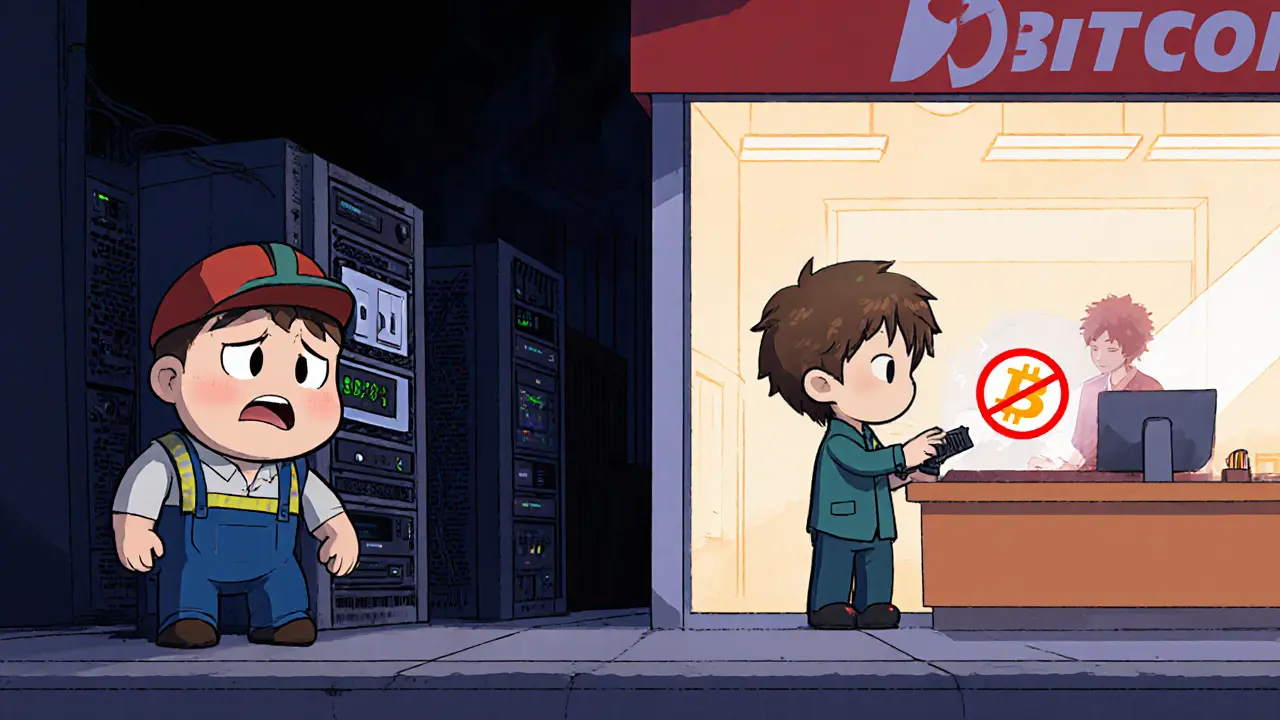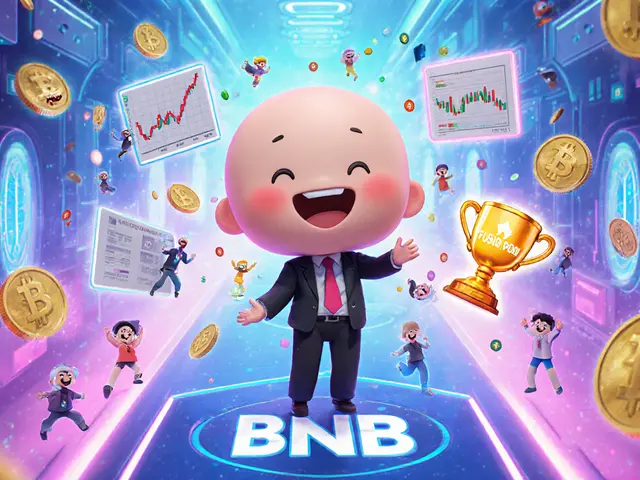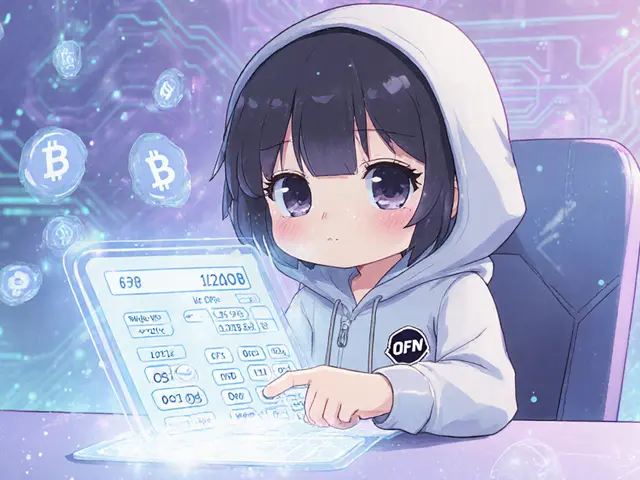Iran Mining Profitability Calculator
Mining Setup
Iran Regulatory Factors
Contrary to popular belief, Iranian cryptocurrency regulations don't force miners to sell their crypto directly to the government. The reality is far more nuanced. Since January 2025, the Central Bank of Iran has been the sole authority regulating all cryptocurrency activities in Iran, but this isn't about mandatory sales-it's about control through licensing, data access, and state oversight. Let's cut through the confusion and explain what actually happens on the ground.
How the Central Bank Took Control
President Masoud Pezeshkian's January 2025 directive gave the Central Bank of Iran exclusive power over digital asset rules. This isn't just a minor policy shift-it means every miner, exchange, or wallet provider must get licensed by the bank. Before this, Iran's crypto scene was chaotic. In December 2024, the bank blocked all crypto-to-rial transactions online, causing a 23-day freeze for over a million users. But by January 2025, they unblocked exchanges only if they had government-approved APIs that shared full user data. Think of it like this: you can trade crypto, but only if the bank can see everything you do.
Licensing: No Mining Without Permission
Iranian miners can't just plug in rigs and start mining. Every operation, big or small, needs a cryptocurrency license from the Central Bank. The bank checks your hardware, location, and financial history. Unlicensed miners face immediate shutdowns. In early 2025, authorities revoked licenses for 300+ unregistered miners in Kerman province after discovering illegal operations using unauthorized power lines. These miners were draining local electricity grids, causing blackouts in cities like Rafsanjan. The message is clear: no license, no mining.
Data Transparency: The Bank Sees Everything
The Central Bank's biggest power? Access to all data. Miners must share transaction records, wallet addresses, and even personal details with the bank. This isn't just standard KYC checks-it's invasive. The AML/CTF protocols require service providers to report every trade and mining activity. The Iran Fintech Association called this a "red line," refusing to comply with data-sharing demands. But the bank insists this transparency is non-negotiable. Without it, they can't track capital flight or prevent money laundering. For miners, this means your private transactions aren't private anymore.

IRGC's Role in State-Controlled Mining
The Islamic Revolutionary Guard Corps (IRGC) dominates Iran's large-scale mining. Since 2019, the IRGC partnered with Chinese companies to build massive mining farms. One example is the 175-megawatt Bitcoin farm in Rafsanjan, Kerman province. These operations run on dedicated power feeds inside IRGC-controlled bases, avoiding public grid strain. Why? To earn Bitcoin and bypass U.S. sanctions. The Supreme Leader approved this strategy to replace lost dollar revenue. While private miners struggle with licensing, the IRGC gets preferential treatment-power, space, and minimal scrutiny. This creates a two-tier system where state-backed operations thrive while individual miners face strict rules.
Energy Crisis and Mining Restrictions
Iran's power grid is struggling. In December 2024, rolling blackouts hit multiple provinces, and officials blamed unauthorized Bitcoin mining for worsening the crisis. The country's electricity costs are low, attracting miners, but the grid can't handle the load. To fix this, the government imposed consumption caps on mining operations. Licensed miners now get fixed power quotas, while unlicensed ones face immediate disconnection. In regions like Sistan and Baluchestan, authorities shut down 120 mining farms in one month. The result? Miners must choose between compliance or losing power. It's a direct link between energy policy and crypto regulation.

Domestic Use vs. Mining for Revenue
Here's the twist: while mining is legal and encouraged, using crypto for payments inside Iran is banned. The government wants Bitcoin for foreign currency, not local transactions. This is why the digital rial pilot program launched on Kish Island-to reduce dollar dependency without letting citizens trade crypto freely. Miners can sell their Bitcoin to state-approved exchanges (which then convert it to rials for the government), but they can't use it to buy goods or services locally. This creates a paradox: miners generate revenue for the state, but regular Iranians can't use crypto to protect their savings from inflation.
Why the Industry Pushes Back
The Iran Fintech Association has publicly opposed the data-sharing rules. They argue that handing over confidential user data violates privacy laws and drives businesses underground. Some platforms have even stopped operating entirely rather than comply. Yet the government isn't backing down. In February 2025, Iran banned all crypto advertising-online and offline-to tighten control. This shows how seriously they take regulation. For miners, it means navigating a minefield: license applications take months, data demands are relentless, and one misstep can shut you down. It's not about sales-it's about survival under strict oversight.
Do Iranian miners have to sell their crypto directly to the government?
No, there's no official policy requiring miners to sell directly to the government. However, licensed miners must share all transaction data with the Central Bank, and large-scale operations are often controlled by the IRGC. The government buys Bitcoin from state-run exchanges to fund sanctions evasion efforts, but private miners can sell to licensed exchanges instead of the state directly.
Why does Iran allow crypto mining but ban domestic use?
Iran uses mining to generate foreign currency (Bitcoin) while avoiding direct dollar transactions. Since U.S. sanctions block Iran from accessing global banking systems, mining Bitcoin provides a way to earn hard currency. Meanwhile, banning domestic crypto use prevents capital flight and keeps the rial stable-however unstable it may be. This creates a controlled system where mining benefits the state, but citizens can't use crypto to hedge against inflation.
How does the IRGC get involved in mining?
The IRGC partners with foreign companies like Chinese firms to build large mining farms. These operations get priority access to power and land, often located on military-controlled bases. For example, the 175-megawatt farm in Rafsanjan is run by an IRGC-linked entity. This gives the military a direct revenue stream from Bitcoin while avoiding public scrutiny. Private miners can't compete with this level of support, creating an uneven playing field.
What happens if I mine without a license?
Unlicensed miners face immediate shutdowns. Authorities conduct raids on suspected operations, confiscating equipment and charging fines. In 2025, over 200 miners were prosecuted for illegal operations, with some facing prison time. The government also cuts power to unlicensed farms during blackouts. Compliance isn't optional-it's the only way to avoid serious consequences.
Is there any hope for more flexible rules?
Not anytime soon. The Central Bank and IRGC have too much control over the system. While the Iran Fintech Association continues to push for privacy protections, the government prioritizes data transparency and revenue generation. Any changes would require Supreme Leader approval, which is unlikely given current geopolitical pressures. For now, miners must adapt to strict oversight or exit the market.




Jenna Em
October 22, 2025 AT 01:35It feels like every crypto law in Iran is a piece on a board no one can see. The Central Bank is pulling strings while the miners watch in the shadows. They say it’s about control, but control is just a word for surveillance. In the end we’re all pawns in a game we didn’t sign up for.
Stephen Rees
November 4, 2025 AT 08:02When you look beyond the headlines, the licensing regime reads like a social contract that nobody agreed to. The bank’s data demands turn private mining rigs into public tax records. It’s a quiet erosion of autonomy, masked as a security measure. One could argue it’s a subtle form of digital colonization.
Katheline Coleman
November 17, 2025 AT 15:29Esteemed colleagues, I would like to posit that the dichotomy presented herein between state revenue generation and individual privacy is emblematic of a broader geopolitical stratagem. The Central Bank’s insistence on exhaustive data disclosure aligns with international anti‑money‑laundering directives, yet the domestic enforcement appears disproportionately stringent. It merits a thorough comparative analysis with other jurisdictions that have pursued analogous regulatory frameworks. Moreover, the involvement of the IRGC introduces a militarised dimension that complicates any purely economic interpretation. In sum, the policy architecture seems designed to optimise fiscal inflows while minimising dissent, a conclusion supported by recent enforcement statistics.
Amy Kember
November 30, 2025 AT 22:55The licensing process is a bureaucratic maze that turns hobbyists into corporate entities. No licence means you’re invisible to the state, which translates to a swift shutdown. Power caps are enforced with an iron fist, and any deviation invites a blackout. Bottom line: adapt or be forced offline.
Evan Holmes
December 14, 2025 AT 06:22Regulation overreach, plain and simple.
Isabelle Filion
December 27, 2025 AT 13:49Ah, the elegant ballet of licensing and data extraction-truly a masterpiece of statecraft. One can only admire how the IRGC pirouettes across the energy grid whilst the average miner is left to waltz in darkness. The sheer subtlety of this orchestration is almost poetic, if one enjoys watching bureaucratic oppression performed with a velvet glove.
Anna Kammerer
January 9, 2026 AT 21:15Honestly, the whole setup reads like a cautionary tale for anyone thinking crypto is a free‑wheeling frontier. The state’s appetite for data is insatiable, and the IRGC’s involvement makes it a whole new level of “big brother meets big mining”. If you’re planning to set up shop in Iran, bring a lawyer, a power engineer, and a thick skin for the inevitable surveillance.
Mike GLENN
January 23, 2026 AT 04:42Let’s walk through the entire landscape, because the devil is truly in the details. First, the Central Bank’s 2025 decree created a monopoly over any digital asset activity, effectively turning every exchange, wallet, and mining operation into a state‑regulated entity. That means you cannot simply plug in a GPU rig and hope to stay under the radar; you must file an application, submit exhaustive hardware inventories, and disclose your financial history. The licensing board then conducts site inspections, often dragging in local power authorities to verify your electricity consumption, which-given Iran’s chronic energy shortages-adds another layer of scrutiny.
Second, the data transparency clause forces miners to report every transaction, every mined block, and even personal identifiers to a centralized database. This isn’t a standard KYC measure; it’s a full‑blown surveillance apparatus designed to track capital flight and monitor any potential subversive activity. The Iran Fintech Association has called it a “red line”, but the bank has doubled down, arguing that without such data they cannot combat money laundering or sanctions evasion.
Third, the IRGC’s involvement skews the playing field dramatically. Their large‑scale farms, often co‑located with military installations, receive dedicated power feeds and are exempt from the typical consumption caps that burden private operators. While a small miner might be limited to a few hundred kilowatts, an IRGC facility can commandeer megawatts, effectively monopolising the most lucrative mining profits.
Fourth, the energy crisis is not a side effect but a policy lever. Rolling blackouts in late 2024 were officially blamed on unauthorized mining, prompting the government to impose strict caps on power usage for licensed miners. The caps are allocated on a rotating basis, and any deviation triggers an immediate disconnection-often at the most inconvenient times.
Fifth, the paradox between mining and domestic crypto use is stark. The state encourages Bitcoin extraction to generate hard currency for sanction evasion, yet it bans any local cryptocurrency transactions to prevent capital outflows and preserve the rial. The digital rial pilot on Kish Island is a controlled experiment that allows the government to retain the foreign exchange benefits while denying citizens the ability to hedge against inflation.
Sixth, the enforcement arm is uncompromising. Unlicensed operators face raids, equipment confiscation, and hefty fines, with some cases resulting in criminal charges and imprisonment. In 2025 alone, over two hundred miners were prosecuted, and many more have been forced to shutter operations by the threat of power cuts.
Seventh, the regulatory environment is unlikely to loosen. The IRGC’s revenue streams and the Central Bank’s data mandates are entrenched interests that would require a top‑down political shift-something the Supreme Leader is unlikely to entertain amidst ongoing sanctions pressure.
Eighth, for those considering entry into the Iranian mining sector, the roadmap is clear: secure a license, comply with exhaustive data reporting, negotiate power allocations, and brace for the possibility of state intervention at any moment. Any misstep can result in a total shutdown, a hefty fine, or even legal prosecution.
Ninth, the broader implication is that Iran’s model showcases how a government can leverage cryptocurrency mining for state revenue while maintaining tight control over its citizens’ financial autonomy. It serves as a case study for other regimes contemplating a similar balance of extraction and restriction.
Tenth, the moral calculus for miners is complex: do you accept the surveillance and potential profit, or do you abandon a lucrative venture in favour of privacy and principle? The answer depends on one’s risk tolerance, ethical stance, and willingness to navigate a labyrinthine regulatory maze.
BRIAN NDUNG'U
February 5, 2026 AT 12:09While the preceding exposition is undeniably thorough, it is worth emphasizing that adherence to the licensing framework can also unlock tangible benefits. Licensed operators gain access to stable power allocations, legal market channels for Bitcoin sales, and a degree of operational legitimacy that deters arbitrary shutdowns. In other words, compliance may well be the most pragmatic path forward for those seeking sustainable profitability under the current regime.
Donnie Bolena
February 18, 2026 AT 19:35Wow, what a rollercoaster, right?,, the situation in Iran is a perfect storm of policy, power, and profit,, but hey, there’s always a silver lining,, you can still mine if you jump through the licensing hoops,, and maybe even get a stable power line,, just remember to keep your data logs tidy,, and watch out for those IRGC farms that seem to have unlimited juice,, stay flexible,, stay informed,, and you might just ride this wave successfully,,